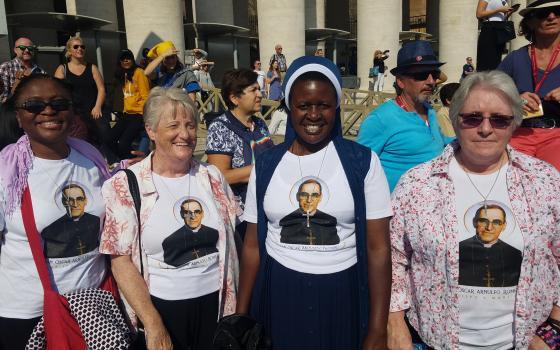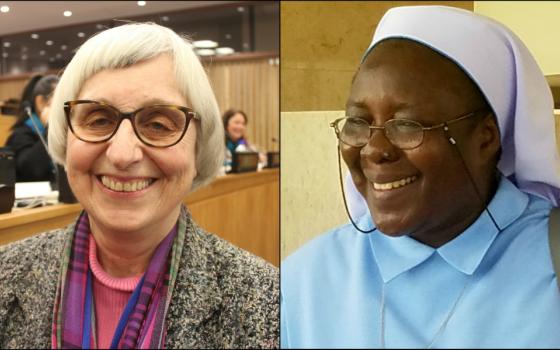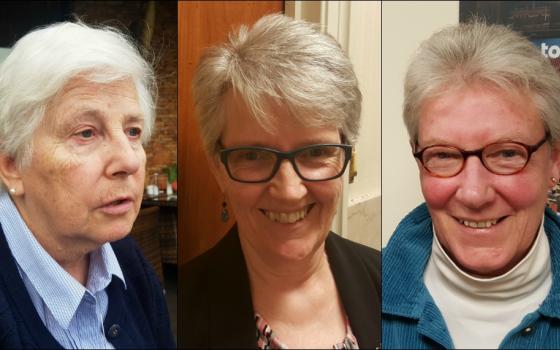Looking back on the year, I have at least one indelible memory: being in the crowd at St. Peter's Square on Sunday, Oct. 14, the day that Óscar Romero and six others were canonized.
For a journalist in his late 50s whose interest in international affairs and theology began as a college student during the time Romero was assassinated, it was a searing and memorable occasion.
Everyone there, particularly those of us who have held Romero in our hearts through the years, could not help but be touched by the poignant moment and what it signified. To be in a crowd of so many people of different countries, cultures and life experiences — not to mention flags! — felt like a real example of global solidarity.
Those around me shared similar feelings. I spoke briefly that day to members of the Sisters of the Sacred Heart of Jesus and Mary, a U.K.-based congregation. They were there to celebrate, commemorate and honor not only Romero but what his ministry and martyrdom signified: something universal.
"People are not listened to, they are oppressed, and then, suddenly, they have a voice," congregational member Sr. Jane Francis told me of what Romero had come to symbolize for the oppressed and marginalized.
Sr. Eileen McLoughlin agreed. "You can't sanitize a prophet."
Commemorating that prophetic voice was a sign of hope — and I have thought of Romero and that experience in St. Peter's often in the following months. But that special moment also prompted me to begin thinking about the year now ending. Was the hope I felt emblematic of 2018? Or has it been a year of pessimism, particularly when migrants and refugees — those Romero championed when he was alive — were demonized at so many levels?
To help me better put the year into perspective, I asked a number of sisters I know and encountered this year at assignments in Rome, Uganda and at the United Nations their thoughts on 2018. Was it a good year? A bad year? Hopeful? A slog? And what may 2019 bring?
Following are their thoughts, edited and condensed.
Sr. Carol De Angelo, director of the Office of Peace, Justice and Integrity of Creation, Sisters of Charity of New York:
I have experienced this year as a whirlwind. The demands have increased: to keep current on issues and events that are ever-changing; to critically analyze what is happening while also listening with a contemplative attitude and open heart and mind; and to discern the actions that we as women religious are called to as we build up the "kingdom of God" and bring forth local and global relationships, structures and systems that are respectful, just, inclusive, compassionate and whole.
There is progress. As individuals and as a world community at the grassroots level, the awareness of our interconnectedness is growing, that what happens to one part of the body affects all. That phrase "We are part of the web of life" is not just words but part of a growing consciousness. I see this at meetings, at rallies, at vigils and press conferences. I hear this in conversations.
My greatest challenge this year has been to stay rooted in the call of Laudato Si' and living Gospel values. To remember, to stop and breathe in the beauty of all God's creation while listening to the cries of the Earth and cries of its people and all creation. To trust that the power of God's love is at work amidst the chaos and contradictions we are witnessing. That living with a contemplative attitude and open heart and mind will transform and heal me and also participate in the healing of our world.
Sr. Draru Mary Cecilia, executive director of African Sisters Education Collaborative and a member of the congregation Little Sisters of Mary Immaculate of Gulu, in northern Uganda:
In general, 2018 has been very volatile, with a lot of divisions in the world and also a lot of fear, globally. There are many people trying to bridge the gaps — though for the most part, the "bridge builders" are not in power. The majority in power are not approaching problems in terms of the collective and the greater good. They are emphasizing "them" against "us"; they're using divisions to maintain power and to incite people against each other. Look at the language about migration: "They're coming into our countries. They're criminals."
But as I said, there are those people working to build trust, to build coalitions — lawyers at the border of the U.S. and Mexico, where there are also doctors and social workers working. These people are not in power, in positions of authority, but they are making a difference because they are at the grassroots. It is important to build these bridges, and I see many signs of hope in that regard.
Loreto Sr. Patricia Murray, executive secretary of the International Union of Superiors General (UISG):
We're all aware that it was a year of increased polarization, and that is coming from a lot of fear, a lot of fear of "the other." Because of that, I think the role of sisters is more critical than ever: the work of bridge-building, of witnessing to diversity, as well as to prayer life and community life that is reflective and reading "the signs of the day." And leading to new pastoral responses. At UISG, we've started a new ministry of Muslim women and Catholic sisters working on the issue of human trafficking. That is based on the belief that you can't fear "the other" when you know "the other."
Sr. Winifred Doherty, U.N. representative of the Congregation of Our Lady of Charity of the Good Shepherd:
Multilateralism was under threat in 2018, so the fact that the United Nations continued as a world body, as an organization — that's important. And even with some countries falling out from the global compact on migration, the fact that the compact was completed and ultimately approved was a very positive thing.
At the same time, the U.N. as a body has reached a kind of impasse: Here, there are no more words to be said. When it comes to the SDGs [sustainable development goals, the UN's global goals to end poverty and improve social conditions], we're now talking implementation by the nation-states, and that's a difficult moment. That's when it's time to say, "Do what you said you would do."
The issue of social protection will be a big issue for the U.N. next year, and changes in improving social protection are being led by women. The most hopeful thing I saw this year was when I visited Kenya: We met a group of older women who were receiving old-age pensions for the first time and the sense of pride they displayed was very real. They had cash of their own for the first time in their lives; one woman said she had never experienced that in her 70 years. There was a sense of security and well-being there. The lesson is: If social protections are provided, people's dignity is enhanced. It's not the dollars that give you dignity. It's the recognition a pension provides. People are empowered.
Sr. Margaret Mayce, who represents the Dominican Leadership Conference at the United Nations:
There has been a lot of activity at the U.N. this year, and with conferences like the ones just completed on migration and climate change, these issues have assumed a greater sense of urgency than ever. In a way, the world is coming together to solve problems.
But my country, the United States, is driving a wedge into the multilateral processes, and our government is driving the same wedge into democratic processes, belittling the values that have held us together as a nation for more than 200 years. We've not lived those values perfectly as a nation, but they have always made us strive to do better.
What's driving this and many things now is fear, fear of "the other." A lot of people throughout the world are watching the U.S. now, our politics, our government, and I think what they see is part of the reason that Europe is moving to the right, especially on the issue of migration.
I believe in national sovereignty, and the recent migration and refugee compacts do not undermine sovereignty at all, but simply underline the idea that no country can "do it alone" when it comes to migration. There is a terrible need now for nations to work together to solve problems.
Ultimately, it's not an issue of numbers but of people — people with life stories who have been uprooted because of wars, political events, environment, climate change. We've lost the ability to see the human element in things, and part of the reason for that is because our leaders stoke up fear of "the other."
[Chris Herlinger is GSR international correspondent. His email address is [email protected].]



